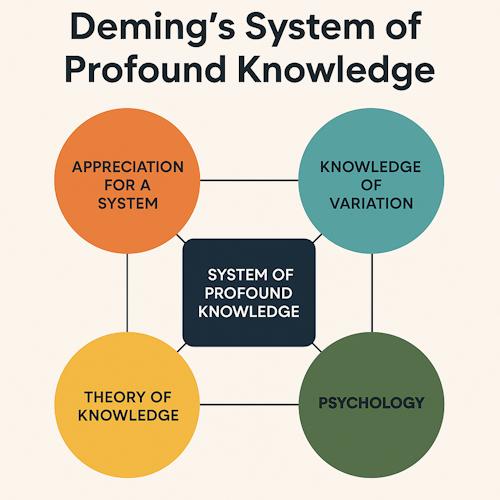Deming's System of Profound Knowledge
Understand systems, variation, learning, and psychology to lead effective change.
"A system must be managed. It will not manage itself. Left to themselves, components become selfish, competitive, independent profit centers, and destroy the system." 1

W. Edwards Deming's System of Profound Knowledge is a cornerstone of modern systems thinking and quality management. It integrates four interrelated areas: appreciation for a system, knowledge of variation, theory of knowledge, and psychology. Originally developed to transform manufacturing, these ideas underpin much of Agile thinking today. Deming's system encourages organizations to shift from blaming individuals to improving the system, to adopt learning mindsets, and to focus on long-term improvement over short-term performance. In Agile environments, where adaptation, collaboration, and continuous learning are key, Deming's thinking offers a foundational lens for interpreting team and organizational behavior.
Impact on Agile Teams & Organizations
Agile frameworks rely heavily on systemic feedback, team collaboration, and empirical learning. Deming's four pillars help leaders and teams align on purpose, reduce waste, and create humane systems.
- Appreciation for a System:
- Encourages Agile teams to understand how they fit into the larger product and organizational ecosystem.
- Helps avoid local optimization that undermines global outcomes.
- Knowledge of Variation:
- Guides teams to distinguish between common-cause and special-cause variation.
- Informs stable velocity expectations, outcome forecasting, and improvement cycles.
- Theory of Knowledge:
- Promotes empirical validation through experiments and Retrospectives.
- Supports test-and-learn approaches fundamental to Agile product discovery.
- Psychology:
- Recognizes the importance of motivation, intrinsic rewards, and team dynamics.
- Encourages safety, autonomy, and collaboration as essential to performance.
Scenario
An Agile organization notices inconsistent delivery across its teams. Leadership begins enforcing stricter deadlines and more frequent reporting. However, morale declines, defects rise, and throughput does not improve.
- Developers feel micromanaged and focus on finishing stories, even if quality suffers.
- Scrum Masters find Retrospectives becoming performative.
- Product Owners are caught between stakeholder pressure and technical debt.
The root of the problem lies not in individual effort but in how variation, learning, and psychological safety are misunderstood. Teams are responding to systemic incentives rather than a shared understanding of improvement.
This scenario shows how a lack of systems thinking leads to reactive behavior, frustration, and dysfunction. Deming's framework would redirect focus from individual accountability to systemic inquiry.
Ways to Mitigate:
To realign with Deming's principles, organizations can integrate the following practices:
- System Awareness:
- Map value streams to identify bottlenecks and dependencies.
- Use Big Room Planning or system-level Retrospectives.
- Variation Literacy:
- Teach teams to use control charts to track cycle time or defect trends.
- Distinguish variation that's natural from that which signals broken processes.
- Learning Culture:
- Promote hypothesis-driven development, not just incremental delivery.
- Encourage post-mortems that explore "what the system allowed", not just what failed.
- Human-Centered Design:
- Invest in team psychological safety assessments.
- Involve people closest to the work in decision-making.
Conclusion:
Deming's System of Profound Knowledge complements Agile by offering a coherent, systemic view of how organizations learn and improve. It shifts the focus from individuals to systems, from output to knowledge, and from compliance to motivation. For Agile coaches, these principles serve as a diagnostic and design tool for healthy, adaptive teams. When applied consistently, they support deep transformation, not just superficial adoption.
Key Takeaways for Agile Teams
- Deming's four areas provide a blueprint for Agile maturity.
- Focus on systems, not just team-level practices.
- Understanding variation helps avoid misguided metrics and blame.
- Learning and experimentation need structure, not just encouragement.
- Psychological safety is central to sustained team performance.
Summary
Deming's System of Profound Knowledge gives Agile teams a deeper frame to understand their work, their outcomes, and their culture. Rather than chasing metrics or enforcing discipline, teams and leaders can use Deming's lens to explore how systems, variation, knowledge, and psychology shape results. This leads to more thoughtful Agile practices, better collaboration, and a sustainable path to improvement.